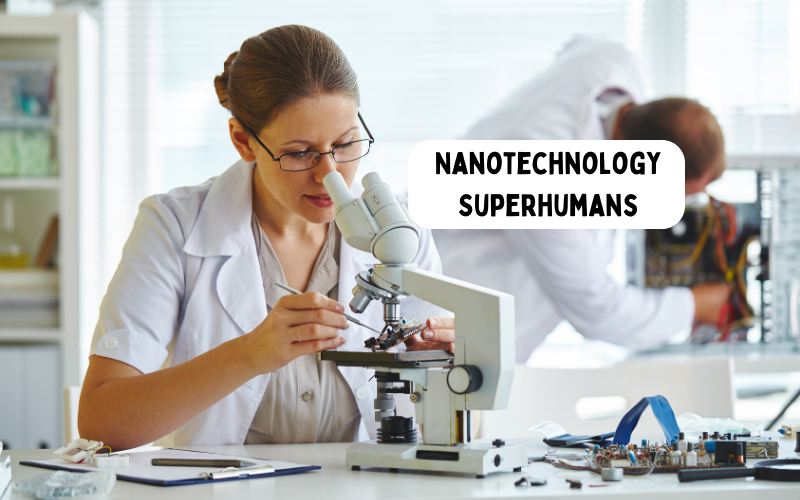
Nanotechnology Superhumans
Nanotechnology Superhumans advancements have revolutionized various industries and given rise to many incredible innovations over the past few years.
One such area of exploration is the concept of “nanotechnology superhumans.” Nanotechnology can enhance human capabilities and push the boundaries of what we thought was possible.
Moore Nanotechnology
Moore’s Nanotechnology combines the principles of nanotechnology with Moore’s Law, which stipulates that the number of transistors on a microchip doubles every two years.
Nanotechnology enhances the performance and miniaturization of electronic devices through precise manipulation of materials and structures at the nanoscale.
This enables compact, energy-efficient devices with improved functionalities, revolutionizing fields like semiconductor technology and consumer electronics.
Nanotechnology plays a vital role in pushing the boundaries of semiconductor technology, facilitating the development of smaller, faster, and more energy-efficient electronic components.
Moore Nanotechnology possesses immense potential to revolutionize various industries and propel advancements in electronics, medicine, energy, and materials science.
It stands poised to shape the future of technology by driving innovation and transformative breakthroughs.
Understanding Nanotechnology
Nanotechnology encompasses the manipulation and utilization of materials and devices at the atomic and molecular scale, typically ranging from one to 100 nanometers in size.
At this scale, matter undergoes significant changes in its properties, presenting thrilling opportunities for scientific exploration.
Through the manipulation of materials at the nanoscale, scientists can unlock unprecedented functionalities and capabilities that were once beyond imagination.
Nanotechnology Applications in Medicine
Medicine stands as one of the most promising domains for nanotechnology. By engineering nanoparticles.
It becomes possible to precisely target diseased cells, administering medications with exceptional accuracy and reducing side effects to a minimum.
Nanomedicines carry the promise of transforming cancer treatments, infectious disease management, and the management of chronic conditions.
Their potential to revolutionize healthcare is poised to bring about remarkable advancements in medical care.
Moreover, nanotechnology facilitates the advancement of sophisticated diagnostic tools capable of early-stage disease detection.
This capability has the potential to significantly improve healthcare outcomes by enabling timely interventions and treatments.
Biosensors utilizing nanoscale components offer high sensitivity and accuracy, enabling rapid and efficient disease detection.
Nanotechnology and Physical Enhancements

Nanotechnology holds the promise of enhancing human physical capabilities. By integrating nanoscale devices and materials into our bodies, we may see unprecedented advancements in strength, endurance, and sensory abilities.
Imagine individuals with enhanced muscle fibers or bones that are stronger and more resilient, enabling superhuman feats of strength and agility.
Moreover, nanotechnology holds great promise in advancing prosthetic limb technology, enabling the development of highly sophisticated prosthetics that closely replicate natural movement and sensation.
This breakthrough has the potential to significantly enhance the quality of life for individuals with limb loss, offering them greater mobility and a more immersive sensory experience.
This advancement holds the potential to improve the quality of life for individuals living with limb loss, offering them increased mobility and a heightened tactile experience.
By integrating nanoscale sensors and actuators, bionic limbs hold the potential to provide individuals who have lost limbs with the opportunity to fully restore functionality, surpassing the limitations of conventional prosthetics. This breakthrough opens doors for unprecedented levels of mobility and function.
This remarkable advancement opens doors for enhanced mobility and a more natural and intuitive user experience.
Cognitive Enhancements through Nanotechnology
Apart from physical enhancements, nanotechnology also holds the potential in augmenting cognitive abilities.
Nanoscale devices hold the potential to augment memory, learning, and information processing capabilities.
Through brain interfaces, nanotechnology has the capacity to enhance cognitive functions, resulting in improved problem-solving abilities, heightened creativity, and enhanced memory retention.
This exciting prospect could revolutionize the way we harness and expand our intellectual capacities.
However, it’s crucial to address ethical concerns surrounding cognitive enhancements. Questions arise about the fairness of such enhancements and the potential creation of unequal societies.
Striking a balance between technological advancements and ethical considerations is essential in ensuring a responsible and inclusive future.
Ethical Considerations and Concerns
As with any emerging technology, nanotechnology superhumans raise ethical considerations and concerns.
The widespread implementation of nanotechnology enhancements has the potential to widen societal disparities, creating a divide between those who can afford such advancements and those who cannot.
Furthermore, it is essential to address and regulate concerns regarding privacy, informed consent, and the long-term effects on human health associated with nanotechnology.
These considerations are critical for ensuring responsible and ethical development and deployment of nanotechnology.
These considerations are paramount in ensuring the responsible and ethical implementation of nanotechnology advancements.
The Future of Nanotechnology Superhumans
While nanotechnology superhumans still remain largely speculative, the potential for these advancements is awe-inspiring.
The relentless research and development efforts in this field persistently push the limits of what can be achieved, driving forward the frontiers of possibility.
While navigating the challenges and ethical considerations, it is essential to prioritize responsible innovation. Ensuring that the advantages of nanotechnology are accessible to all and contribute to the overall improvement of society.
Conclusion
Nanotechnology presents a realm of possibilities for extraordinary human enhancements, encompassing both physical and cognitive capabilities.
By incorporating nanoscale devices and materials into our bodies, we have the potential to redefine the boundaries of human potential.
However, it is crucial to approach this field with caution, considering the ethical implications, and ensuring that advancements are pursued responsibly and inclusively.
FAQs
Q: How does nanotechnology enhance physical capabilities?
Nanotechnology enables the development of materials that exhibit increased strength, resilience, and the potential to enhance attributes such as strength, endurance, and sensory abilities.
Q: Can nanotechnology be used for medical treatments?
Certainly, nanotechnology shows immense potential in the field of medicine, presenting promising applications such as targeted drug delivery and the advancement of sophisticated diagnostic tools.
Q: Are there any ethical concerns associated with nanotechnology superhumans?
Yes, ethical concerns arise regarding fairness, societal divisions, privacy, informed consent, and long-term health effects.
Q: What is the future of nanotechnology superhumans?
While still speculative, ongoing research in nanotechnology continues to push the boundaries, and responsible innovation is key to shaping the future.
Q: How can nanotechnology impact cognitive abilities?
Nanoscale devices can potentially enhance memory, learning, and information processing, augmenting cognitive capabilities.




